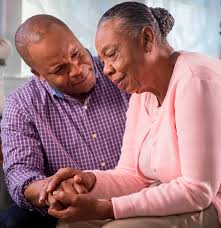
As people age, having a strong social support system becomes increasingly important. Research has shown that older people who live with a partner tend to experience better health outcomes and longer lifespans than those who live alone. In particular, having a loving partner has been found to play a critical role in promoting physical, emotional, and mental well-being for seniors.
One of the main reasons that having a partner can benefit older adults is the sheer fact that they have someone to rely on. As people age, they may experience a wide range of health issues, from chronic conditions to acute illnesses. When they have a partner, they can rely on them to help manage their health and well-being. This can include everything from helping them get to doctor’s appointments to administering medications to providing emotional support.
Additionally, having a partner can promote better physical health for older adults. For example, when seniors live with a partner, they may be more likely to engage in physical activity like taking walks or doing yoga together. This can help promote cardiovascular health, maintain muscle mass, and improve overall quality of life.
Furthermore, having a partner can also benefit older adults’ mental health and well-being. Research has shown that seniors who are in a committed relationship tend to experience lower rates of depression and anxiety compared to those who are single. This may be because having a partner can provide a sense of security, companionship, and social connection that is essential for emotional well-being.
Of course, it’s important to note that not all relationships are created equal. It’s not simply being in a relationship that leads to better health outcomes, but rather being in a loving, supportive partnership. Seniors who are in unhealthy or unhappy relationships may actually experience worse health outcomes than those who are single.
In addition, it’s worth noting that not all older adults will have the opportunity to live with a loving partner. Many seniors may have lost their partners to illness or death, or may never have been in a relationship in the first place. For these individuals, it’s important to focus on building a strong social support network that includes friends, family members, and caregivers. This can help provide the same benefits in terms of emotional support, companionship, and physical well-being.
Ultimately, the takeaway is clear: having a loving partner can make a significant difference in the health and well-being of older adults. Whether it’s by providing physical support, emotional connection, or simply being a source of love and companionship, a partner can make all the difference. For those who have already found a loving partner, it’s important to cherish them and nurture the relationship, recognizing the many benefits it provides. For those who are still searching, it’s never too late to seek out new connections and build meaningful relationships that can provide the same benefits for years to come.
For more information, about in home personal care, for seniors and disabled adults. Call Jamhuri Healthcare Services Inc. 1-800-547-2851 or visit us on the web: www.jamhuricares.com